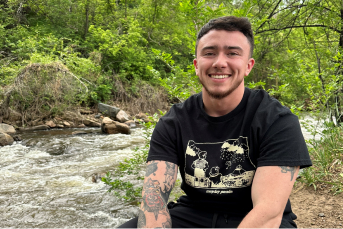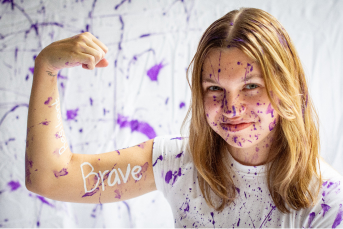-min.jpeg)
Meet social worker Nicole from Long Island, NYC. She developed epilepsy at a later age. In her spare time you can find her either on a soccer field or thrifting. In 2020, she published a book entitled ‘Creative Mind: A Diary of Teenage Mental Illness’. Read her story below.
Tell us about your epilepsy story
To my knowledge I wasn’t born with it. At 19 I started having seizures but no one knew why. There is no family history or anything that would cause it. I started having seizures for a few months, and went to lots of doctors for spinal taps, MRIs, and lots of tests.
I found out I had a brain tumor, my mood and personality was distorted. I visited a psychologist who gave me anxiety medication. The psychologist thought it was a chemical imbalance. With another MRI they found a benign tumor. The day after I went to NYU Langone Epilepsy Center, that's where I had my brain surgery.
It was a very quick process, since it was growing they had to work quickly. I was there for 3 and a half weeks - it felt like forever. After surgery I had to learn motor skills and how to walk again. It's been 10 years since, but there's still tissue in my brain that can cause a seizure.
How did your epilepsy start?
Before diagnosis, my first seizure happened at midnight, my mum thought I was sleepwalking. I was in the hallway flapping my hands, then I went back to bed. My mom's a nurse and she didn’t know it was a seizure, now she's a lot more aware of it. I’m thankful she's a nurse, because she's been knowledgeable about all the treatments and medications I've been put on.
What support do you have?
I know of one community program group, but every time I signed up for an event - I just couldn't go. Not sure if it is anxiety or just having issues with talking about my epilepsy. All my family are very supportive. The only thing that worries me is if different family members know about my seizures or what to do. I feel awkward telling them about it.
Read more: How to find epilepsy support groups
Talking to work about your epilepsy
I've always liked helping people, I would volunteer a lot in school, from my own personal experiences I wanted to get into social work. I’ve been at my current job for 8 months but I haven't disclosed my epilepsy. In the past, I didn't disclose it because I didn't want to face discrimination or have people think I couldn't work. I feel it isn't their business until I have a seizure at work. For example, if I have an appointment, I say it's a check up.
Read more: Our guide to discrimination at work
How do you use the Epsy App?
Because I have a short term memory from my surgery, I have many different reminders. I have an Alexa, and I use the Epsy App. I use it to remind me to take my medications, it’s an extra reminder to let me know I have taken them. I like reading other articles in the app, to get more information for managing my symptoms and seeing what other people are going through. I hear stories from others and then think 'oh so that experience wasn't just me'.
Going through surgery and experience with doctors
At NYU hospital, everyone was super supportive. I'm not from the city, so I had to travel far. My parents couldn't stay long due to visiting hours, the Epilepsy Foundation of America can help people going through surgery, they funded a hotel room for my parents nearby to where I was getting treated. The doctors and nurses knew it was a difficult situation, they tried to be really positive and make me laugh.
Advice to others
Epilepsy is a hidden disability, you can't always see it. If I'm feeling off or forgetting things, it may seem normal to someone else, but for someone with epilepsy it could mean many different things.
Epilepsy can seem scary but some people could be very successful despite their condition. I feel I'm living proof of that; I'm married, I have a good career. I can still do the things I enjoy like soccer and swimming, but I still need to be mindful to take care of myself.

















